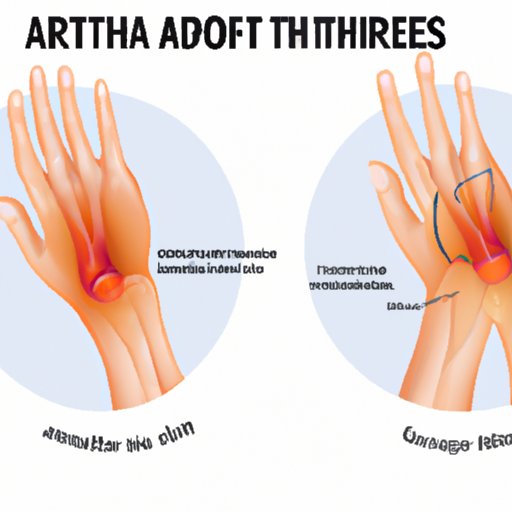
Introduction
Arthritis is a common condition that affects millions of people around the world, but many of us think of it as a disease that only affects older individuals. However, arthritis can also affect young adults, including those in their 20s. This article will debunk myths, explain the real risks, and explore coping strategies and treatment options for those diagnosed with arthritis in their 20s.
The Surprising Truth About Arthritis and Young Adults: Understanding Early-Onset Arthritis in Your 20s
When we think of arthritis, we typically think of it as a condition that develops over time due to wear and tear on the joints or as a result of aging. However, arthritis can actually occur in younger individuals, including those in their 20s. Early-onset arthritis refers to arthritis that develops in individuals under the age of 45, and it can develop for a variety of reasons.
There are several types of arthritis that can affect young adults, including rheumatoid arthritis, psoriatic arthritis, juvenile idiopathic arthritis, ankylosing spondylitis, and reactive arthritis. Rheumatoid arthritis, in particular, is a chronic autoimmune disease that can develop at any age and often starts in a person’s 20s or 30s.
The Rise of Arthritis in Young Adults: What You Need to Know
While arthritis is often seen as a condition that only affects older individuals, the reality is that more young adults are being diagnosed with arthritis than ever before. In fact, research suggests that the incidence of arthritis in younger age groups has been steadily rising over the past few decades.
One reason for the increase in early-onset arthritis cases could be attributed to a variety of lifestyle changes, including changes in diet, physical activity, and exposure to environmental toxins. Furthermore, the rise of computational reliance, demanding jobs, and a more sedentary lifestyle could also contribute to the increased risk of developing arthritis.
Why Arthritis Is No Longer an ‘Old Person’ Disease: Young Adults and Arthritis in Today’s World
Arthritis used to be thought of as a disease that only affected the elderly population. However, with the increase in early-onset arthritis cases, it’s essential that medical professionals and the public alike recognize arthritis as a condition that affects individuals of all ages.
Recognizing the shift in thinking around arthritis is important because it allows doctors and healthcare providers to more accurately diagnose arthritis in individuals of all ages. By recognizing that a young adult can develop arthritis, doctors can better manage symptoms and offer appropriate treatments and therapeutic programs from the onset of the symptoms.
Debunking the Myths About Arthritis in Your 20s: Understanding the Real Risks and Causes
There are many myths about arthritis in young adults. One of the most common misconceptions is that arthritis only affects individuals who are overweight or obese. In reality, anyone can develop arthritis, regardless of their weight or fitness levels.
While the actual cause of arthritis is unknown, there are several factors that increase the risk of developing arthritis in your 20s. These factors include a family history of arthritis, gender, smoking, infections, and exposure to environmental toxins.
Living with Arthritis in Your 20s: Coping Strategies for a Painful Condition
Living with arthritis can be challenging, both physically and emotionally, but there are several coping strategies that can make it easier to manage pain and stiffness.
One of the most important things to remember is to stay active and keep moving as much as possible. Regular exercise can help reduce pain and stiffness, improve flexibility and strengthen muscles. You should also be mindful of your diet, as certain foods can trigger arthritis symptoms.
It’s important to find emotional support from family, friends, or a support group. These friends can provide you with the needed emotional support that comes with the management of a chronic condition.
Could Your Lifestyle Be Causing Arthritis in Your 20s? Tips for Avoiding Arthritis Triggers
Certain lifestyle factors can contribute to an increased risk of developing early-onset arthritis. These factors include poor diet, sedentary behavior, smoking, and exposure to environmental toxins such as pollution or chemical-containing substances. To lower the risk of developing this painful condition, young adults should adopt a healthy and active lifestyle. Furthermore, it’s also beneficial to minimize exposure to environmental pollutants as much as possible.
From Diagnosis to Treatment: A Guide to Managing Arthritis in Your 20s
If you suspect that you may have arthritis, it’s essential to talk to a health care provider to get an accurate diagnosis. There is no definitive test that can diagnose arthritis, but a combination of laboratory tests, imaging, and physical examination can help evaluate the condition. More often than not, your healthcare provider may create a therapeutic program that encompasses exercise, medication, and healthy habits.
Conclusion
Dealing with arthritis in your 20s can be challenging, but it’s important to remember that you’re not alone. Many young adults are affected by this condition, and there are a variety of treatments and coping strategies that can help you better manage your symptoms. Recognizing the risks and debunking myths surrounding early-onset arthritis is key in managing pain and living a healthy lifestyle. So, stay active, engaged, and conscious about the triggers that may aggravate your pain.




